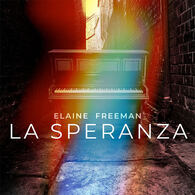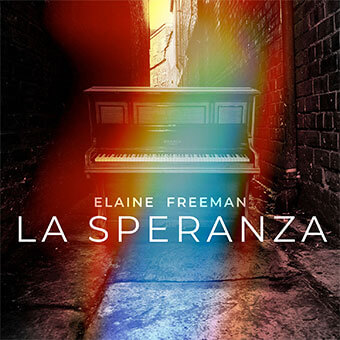Composer's original score for "The Line" premiered at the 2024 Dublin International Film Festival3/29/2024
"The Line," from writers Lee Crowley and Pete Daly, and director Danny McCafferty, premiered at this year's Dublin International Film Festival (DIFF) in Ireland. The film features music by Elaine Freeman.
In the Press... The Journal - Danny McCafferty Rte.ie Entertainment - Dublin International Film Festival up and rolling for 2024 Limerick Post - Short films by Limerick artists to be showcased at Dublin International Film Festival Goss.ie - Dublin International Film Festival announces star-studded lineup for 2024 Hot Press - Dublin International Film Festival releases full line-up RADIO: Limerick Today - Interview with lead actor Joe Mullins Phoenix FM - DIFF Preview RTÉ RnaG - Interview with Danny McCafferty Elaine Freeman realizes her latest discographic work entitled 'La Speranza', a collection of intimate, personal, consolatory songs, composed on the spot, 'by ear', and performed by heart, without the need for written music. Her style moves between different genres, from music that recalls classical stylistic features, up to the minimalist one, passing through more pop atmospheres. A mixture of genres that widely stimulates Freeman's creativity, which proves to be at ease in composing and performing music of different genres, nourished and enriched by her sweet and expressive touch.
--- Review by Luciano Feliciani, Kathodik Webzine https://www.kathodik.org/2021/04/24/elaine-freeman-la-speranza/ By PARMA Recordings, April 16th, 2021
“The Inside Story,” is a PARMA Recordings blog series exploring the inner workings and personalities of their composers and performers. https://www.parmarecordings.com/inside-story-elaine-freeman-and-la-speranza/ Composer and songwriter Elaine Freeman and Big Round Records present LA SPERANZA, a careful selection of piano music, composed by ear, memory and touch without sheet music. Not quite classical, not quite pop, these pieces have the ability to appeal to both the casual listener and fans of musical minimalism. Read on to discover the tender meaning behind Elaine’s Song for Angelo… Who was your first favorite artist(s) growing up? I listened to so many different artists of all genres growing up that it’s incredibly hard to choose even a few. From a very young age my father would play a lot of Simon and Garfunkel, Bob Dylan, Bruce Springsteen and Elvis in the car each day. And on other days he would play Nana Mouskouri, Demis Roussos, or The Shadows, among many others. I loved classical guitar even though I never played. As I grew older I loved rock and pop and dance, e.g. Nirvana, The Prodigy, Tori Amos, Green Day, anybody who played a piano in pop I thought was a god! I was obsessed with the Welsh singer David Gray, I loved all classical music, and listened to it all night on the radio. In particular, I loved Liszt, Schumann, Beethoven, and Mozart. I really listened to everything. It’s all I did. I still do. My album collection is vast. If you could make a living at any job in the world, what would that job be? Definitely to make a proper living from composing music alone would be perfect. Anything that you love or find so easy and natural has to be an ideal way to make your living! I would love to have the chance to compose for film or tv, and another job I would really love would be music supervisor for a tv show or a movie; I’d love to be in charge of handpicking the music for literally each scene, I like to think I’d be great at it! "The composer and songwriter Elaine Freeman offers us an album of piano music with La Speranza, which, amazingly, was penned by ear, without sheet music. Using memory and touch, the songstress lands somewhere between classical and pop music, as Freeman packs turmoil, grief, nostalgia and so much more into these minimal but impactful compositions.
Freeman starts the listen with the brief “Intro To La Speranza (Song For Angelo)”, where her agile and warm keys set the foundation for the remainder of the listen, and “Mantova” follows with soothing, melodic and inviting key work, as does the playful and precise “Going Home”. The middle portion brings us the sweeping beauty of the title track, where plenty of emotion is present, while “I Love You So Much, I Love You Always (Vincenzo’s Theme)” flows with fascinating chord progressions that are full of timeless intimacy. Near the end, “Leave Me At The Border”, the stand out track, then dances around heart warming melodies, and “Closing” exits on a short, swift finish of elegant and frisky song craft. If you’ve got an ear for piano focused songwriting, you won’t be disappointed here, as Freeman doesn’t fit firmly into one category, but embraces countless influences into a very compelling and creative journey." --- Review by Take Effect https://takeeffectreviews.com/january-2021-4/2021/1/28/elaine-freeman "The material the Dublin-born Freeman creates is slightly different than Pacek's, however: the personalized dimension remains very much in place, but Freeman hews less strictly to a neoclassical style. Instead, her pieces resist easy categorization and emerge simply as spontaneous melodic expressions, a result in keeping with the manner by which they're created. She writes her pieces by ear and plays them as such without sheet music, which lends the material an unfiltered quality. When Freeman plays, music naturally comes out.
Building a piece around a central theme or rhythm, she allows it to organically develop, Freeman choosing to let her music dictate its shape. Feeling and mood are paramount in settings that, like Pacek's, draw directly on unique life experiences. Alternately yearning, sorrowful, melancholy, and wistful, the ten pieces are physical delineations of Freeman's inner world. Though four tracks were recorded in Dublin in 2013 and 2014 and the others in early 2020, consistency of tone and style makes the release sound as if it could have been recorded in a single session. The lovely “Intro to La Speranza (Song for Angelo)” establishes a heartwarming tone, after which the minuet-like lilt of “Mantova” proves as appealing. It was in that small city north of Italy that she'd relocated to nine years ago where she had her first child and days later learned of her dad's sudden passing. Bewilderment and sorrow gradually gave way to recovery and eventually a productive period of composing, with “Mantova” paving the way for other pieces. As composed as “In Here” is on the surface, its title references the fact that inside she was still grieving her father's death. In keeping with the autobiographical nature of the opening pieces, the ones thereafter follow in chronological order. Both “Going Home” and the title track were created after she moved back to Ireland, the rousing buoyancy of the former indicating the return was embraced and “La Speranza” (The Hope) conveying optimism more cautiously and its level-headedness contrasting with the other's joy. Whereas “Going Home” illustrates how effortlessly Freeman's music connects with the listener, “I Love You So Much, I Love You Always (Vincenzo's Theme)” conveys with sincerity her depth of feeling for her eldest son. The journey-like theme of the recording reaches its culmination when “Leave Me at the Border” exudes a mood of contented resolution. If Pacek's album is the more elegantly neoclassical-oriented of the two, both releases are easy to warm to when their contents are so authentic and their expressions so genuine. --- Review by Textura Read the full article: www.textura.org/archives/p/pacek_freeman.htm  Composer and songwriter Elaine Freeman and Big Round Records present LA SPERANZA, a careful selection of piano music, composed by ear, memory and touch without sheet music. Not quite classical, not quite pop, these pieces have the ability to appeal to both the casual listener and fans of musical minimalism. Structured around a central motive or rhythm, most of the works on LA SPERANZA seem to have an inner clock, an inner mechanism. The pieces' playability works in their favor, yet they pack an emotional punch: there's nostalgia, turmoil, grief, a quest for purpose, a struggle for beauty and clarity, all reflective of Freeman's life at various stages, and of the specific periods of their creation. The Composer claims to love all music regardless of genre, and this eclecticism definitely shows in LA SPERANZA. There's always the levity and catchiness of pop music, but one would be hard-pressed to sort the pieces into a definite category. More than anything, they are a unique expression of their inventor's inner world: generally calm and reflected, occasionally wistful and brooding, sometimes bright and soothing. Unconventionally, Freeman wrote all of these pieces by ear, and continues to play them as such. This results in a great spontaneity, forming a coherent whole with both the works' internal structure as well as the autobiographical background behind them. |

